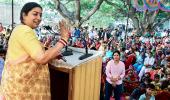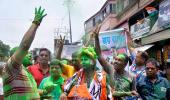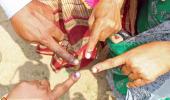The Bharatiya Janata Party suffered stunning losses in three Hindi heartland states, partial poll results showed Tuesday, forcing the party to rely on allies to form the government after a bitter and divisive election that was projected as a referendum on Prime Minister Narendra Modi's popularity.

After 12 hours of counting of votes that began at 8 am, the BJP, whose candidates had contested in the name of Modi, won or was ahead in 240 seats to emerge as the single largest party, a far cry from the 303 it had won last time in the 543-member Lok Sabha to mark the return of coalition politics.
BJP's key allies N Chandrababu Naidu's TDP and Nitish Kumar's JD-U were leading or winning 16 and 12 seats in Andhra Pradesh and Bihar respectively. With the support of its other allies, the BJP-led National Democratic Alliance (NDA) was on course to reach the 272-majority mark. The TDP also swept the assembly elections in Andhra Pradesh dislodging Y S Jagan Mohan Reddy's YSRCP.
Congress president Mallikarjun Kharge termed the poll outcome as the "victory of the people and that of democracy."
“We had been saying that this battle is between public and Modi...This mandate is against Modi. This is his political and moral defeat. It is a big defeat for a person who sought votes in his own name. He has suffered a moral setback," Kharge told reporters at the AICC headquarters flanked by Congress leaders Rahul Gandhi and Sonia Gandhi after the good showing by the Congress.
It is the first time that 73-year-old Modi, who was on track to equal Jawaharlal Nehru's record as prime minister for a third consecutive term, will be dependent on allies to be in the government since he came into politics.
Prime Minister Modi described the NDA's expected majority as a historic feat in India's history, noting that people have placed their faith in the ruling alliance for a third consecutive term.
In a post on X, he said, "I bow to the 'Janata Janardan' for this affection and assure them that we will continue the good work done in the last decade to keep fulfilling the aspirations of people."
The elections also highlighted the revival of the main opposition Congress party under Rahul Gandhi, and the unexpected role of the Samajwadi Party in Uttar Pradesh -- under Akhilesh Yadav -- as a giant slayer.
The trends and results did not throw up a landslide victory the BJP-led NDA had hoped for and what was projected by the exit polls. More than 640 million votes are to be counted in the world's largest democratic exercise.
The Congress, which is part of the opposition INDIA alliance, was leading or winning 99 seats compared to 52 it won in 2019 and eating into the BJP's share in Rajasthan and Haryana. The INDIA bloc won or was ahead in over 200 seats.
As SP chief Akhilesh Yadav kept the INDIA bloc morale high in Uttar Pradesh, the Trinamool Congress, another key ally of the opposition alliance, was leading or winning in 29 seats in West Bengal, higher than its 22 in 2019. The BJP, which had 18 seats in the last Lok Sabha election, was ahead in 12 seats.
In UP, the BJP won or was ahead in 33 seats as against its tally of 62 in 2019 and the SP's numbers went up, largely attributed to three factors -- consolidation of Muslim votes in favour of SP, smart seat sharing agreements with Congress to avoid splitting of non-BJP votes, and widespread discontent with the BJP government over jobs and price rise. The SP was winning or leading in 37 of the 80 seats at stake.
Modi retained the Varanasi seat but with a reduced victory margin of nearly 1.53 lakh votes in Varanasi. In 2019, the margin was 4,79,505.
Rahul Gandhi, often lampooned by the BJP as “Shehzada”, won Wayanad (Kerala) and Rae Bareli (UP) seats by a huge margin of 3,64,422 votes and 3,90,030 votes respectively.
The campaigning for the elections, which were conducted from April 19 to June 1 in seven phases, was marked by divisive communal issues and excessive reliance on Modi for getting votes. The prime minister held more than 300 rallies, travelling tirelessly almost every day to multiple locations.
The results also blew away the BJP narrative that it will score big in the southern states this time. It, however, returned a tally of zero in Tamil Nadu, and lost seats in Karnataka.
The BJP did make inroads in Kerala, winning a seat for the first time in a state where the Congress and the Left are the major political force, and in Telangana where it won or was leading in 8 seats. Popular Malayalam actor Suresh Gopi won the Thrissur seat in Kerala to help the lotus bloom.
In Andhra Pradesh, BJP ally Telugu Desam Party won or was leading in 16 seats and the BJP was ahead or winning in three.
The biggest setback for the BJP, which faced a stronger challenge from the opposition, however, was in the north where, besides UP, the BJP also faced losses in Rajasthan and Haryana.
West Bengal also dealt the party a raw deal, although it more than made up for the losses in Odisha.
Madhya Pradesh went fully saffron with the BJP winning or leading in all 29 seats. In Gujarat, too, BJP was winning or leading in 25 of 26 seats.
The situation was not as decisive in other states.
In Bihar, the BJP was ahead in 12 and its partner JD-U in 13, a vote of confidence for its leader Nitish Kumar who swung from INDIA back to the NDA ahead of the elections. The RJD was poised to win four seats.
In Rajasthan, BJP was ahead only in 14 seats, against all 25 its alliance won last time. The Congress was ahead in eight.
Haryana also threw up a shock result for the BJP, where the party was leading only in five and the Congress in five. In 2019, the saffron party had bagged all 10.
It appeared that the election marked a return to regular politics, where voters were more concerned about bread and butter issues, especially in some Hindi heartland states where the opposition INDIA alliance managed to rally supporters around the issues of unemployment and price rise.
Maharashtra, with 48 Lok Sabha seats, saw the Shiv Sena split down the middle since the last election. The BJP, which won 23 seats five years ago, was down with leads in 11 seats, while its ally Shiv Sena could get seven.
On the other end of the spectrum, the Congress was ahead in 12 seats, up from one, and the Shiv Sena (UBT) in 19. The NCP Sharad Pawar faction could get seven seats, giving the INDIA alliance, forged together by the common dislike of the BJP, a possible 38 seats.
However, a silver lining was provided by Union ministers Nitin Gadkari and Piyush Goyal who appeared on course to easy victories in Nagpur and Mumbai North respectively.
In Odisha, the BJP was doing spectacularly well, with leads in 19 out of 21 seats, while the ruling Biju Janata Dal was down to just one. It was also ahead in the Odisha assembly elections, leading in 76 out of 146 seats, a success show in the state it had never succeeded in capturing.
In Andhra Pradesh, the Chandrababu Naidu-led TDP was ahead in 16 seats of 25, the BJP in three and the YSRCP in four.
rends for Karnataka showed potential gains for the Congress, with leads in nine seats, up from one last time. The BJP, which got 25 seats in 2019, was ahead in 17.
Tamil Nadu seemed to be scripting another story, not ceding any space to the saffron party. The ruling DMK was ahead in 22 and ally Congress in nine, a notch higher than their 2019 positions.











 © 2025
© 2025